29 Jun2021
By Nicole Dunn

You are invited to register for the upcoming BIPOC affinity webinar and White Racial Justice affinity webinar offered as part of the “AACTE Racism is Educator Preparation” series.
AACTE’s “Combating Racism is Educator Preparation Series’ began in 2021 with three specific objectives for our membership, audience, and the field at large:
- Contextualize the role of racism in structural oppression and how the education system at large maintains and promulgates these oppressive systems.
- Engage with you, our audience, to understand you and your organization’s understanding and capacity to address racism using antiracist, abolitionist, inclusive, and intersectional policies.
- Normalize and humanize critical conversations around racism within the field that will lead to collaborative action around structural oppression in education.
28 Jun2021
By Blair Mann
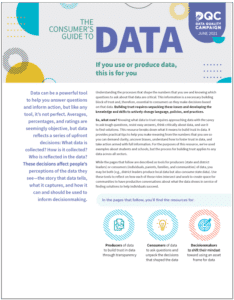 As advocates, we want data to be used for accountability and transparency, to tell stories, and to inform impactful, equitable policies. But without context, clarity, transparency, the stories data could tell about school, student, and teacher experiences can be lost to misinformation and distrust.
As advocates, we want data to be used for accountability and transparency, to tell stories, and to inform impactful, equitable policies. But without context, clarity, transparency, the stories data could tell about school, student, and teacher experiences can be lost to misinformation and distrust.
Last week, the Data Quality Campaign released a new resource that breaks down what it means to build trust in data for both those who share it and those who consume it—providing tips to make meaning from the numbers that you see so you can demand clarity, uncover biases, understand how to foster trust in data, and take action armed with full information.
This Consumer’s Guide to Data is an especially great resource for producers of data (such as state or district leaders) and consumers of data (parents, families, or interested community members), but it can also be valuable to advocates who are looking to support good decision making and storytelling at every level.
Download the guide.
14 Jun2021
By Ward Cummings

On behalf of AACTE and the Advisory Council of State Representatives (ACSR), I am happy to announce the winners of the 2020-21 State Chapter Support Award: The three recipients are Nebraska, California and Kentucky.
It is the mission of AACTE to elevate education and educator preparation through high-quality research, professional practice, and advocacy for all learners in ways that are collaborative and that promote diversity, equity, and inclusion. Each year, AACTE awards funding to a handful of projects organized by state chapters in these areas.
14 Jun2021
By Linda Minor
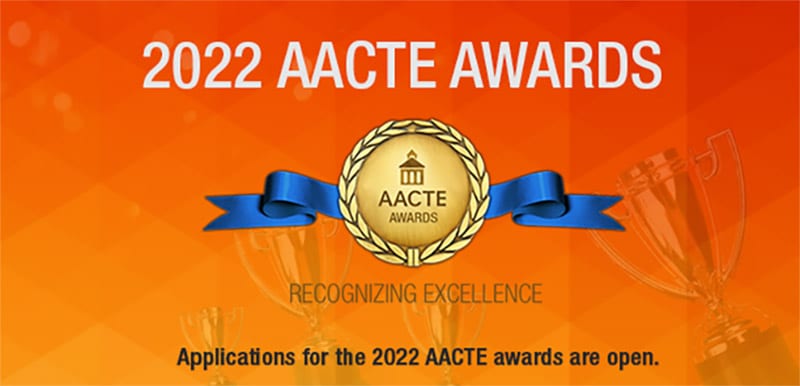 Why wait to submit your application for the 2022 AACTE Awards? Avoid the stress of a last-minute rush and submit your entry early. AACTE Awards can be either self-nominated or nominated by a third party. To submit your nomination, visit AACTE’s online submission site.
Why wait to submit your application for the 2022 AACTE Awards? Avoid the stress of a last-minute rush and submit your entry early. AACTE Awards can be either self-nominated or nominated by a third party. To submit your nomination, visit AACTE’s online submission site.
Winning entries will be selected by AACTE’s Programmatic Advisory Committees and recognized formally at the 2022 Annual Meeting, March 4-6, in New Orleans, LA.
This is the 26th year AACTE’s awards program has been recognizing member institutions’ exemplary programs as well as individuals who have made noteworthy contributions to education preparation. For an overview of the 2021 award winners, see this press release.
08 Jun2021
By Katrina Norfleet
Last month, President Biden called for an unprecedented investment in his FY 22 budget proposal to begin to redress the chronic inequities in our nation’s education system. In a new playbook, the Partnership for the Future of Learning offers a set of high-impact strategies and examples for recruiting, preparing, developing, and retaining high-quality teachers and bringing greater racial, ethnic, and linguistic diversity to the profession.
The 152-page Teaching Profession Playbook was developed by the Learning Policy Institute and the Public Leadership Institute in collaboration with 26 organizations and five individual experts. The digital playbook includes examples of legislation; a curated list of publications, by topic, for further reading; a guide to talking about teacher shortages and strengthening the profession; and examples of research-based policies.
07 Jun2021
By Amy Carlson Gustafson
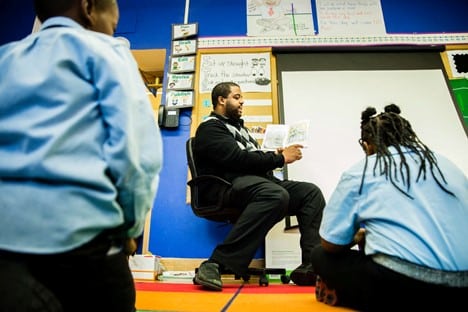
This article originally appeared on the University of St. Thomas Newsroom and is reprinted with permission.
The School of Education at St. Thomas is making inroads to increase the number of people of color who choose to become teachers, and national organizations are recognizing its efforts. In March, the school received notice that the Association of Colleges for Teacher Education (AACTE) accepted its proposal to be part of a consortium to increase equitable access to teaching.
Only around 6% of licensed Minnesota teachers identified as Black, Indigenous and people of color (BIPOC), while 38% of students in the state are nonwhite, according to state data. In efforts to help close that gap, the School of Education will join with other AACTE members to examine entrance requirements for teacher preparation programs. This collaboration exemplifies just one more way in which the school has been working to grow the number of diverse teachers through a variety of programs, including key partnerships.
03 Jun2021
By Kristin Hamilton
The National Board of Professional Teaching Standards is an anti-racist and inclusive organization. We believe that educators must help students consider their role in a diverse world, value individual differences, and—especially in times such as these—we believe in the power of the teaching profession to defend what is good and right for all people.
The National Board for Professional Teaching Standards is seeking applicants from the educator preparation community to serve on the committee that will develop standards in the areas of diversity, equity, and inclusion. These Board certification standards for practicing teachers also impact teacher preparation programs and assessments, professional learning programs, and state licensure systems across the country. The 10-12 committee members will receive an honorarium and will be representative of the diversity among teaching professionals and the students and communities they serve.
14 May2021
By Nicole Dunn
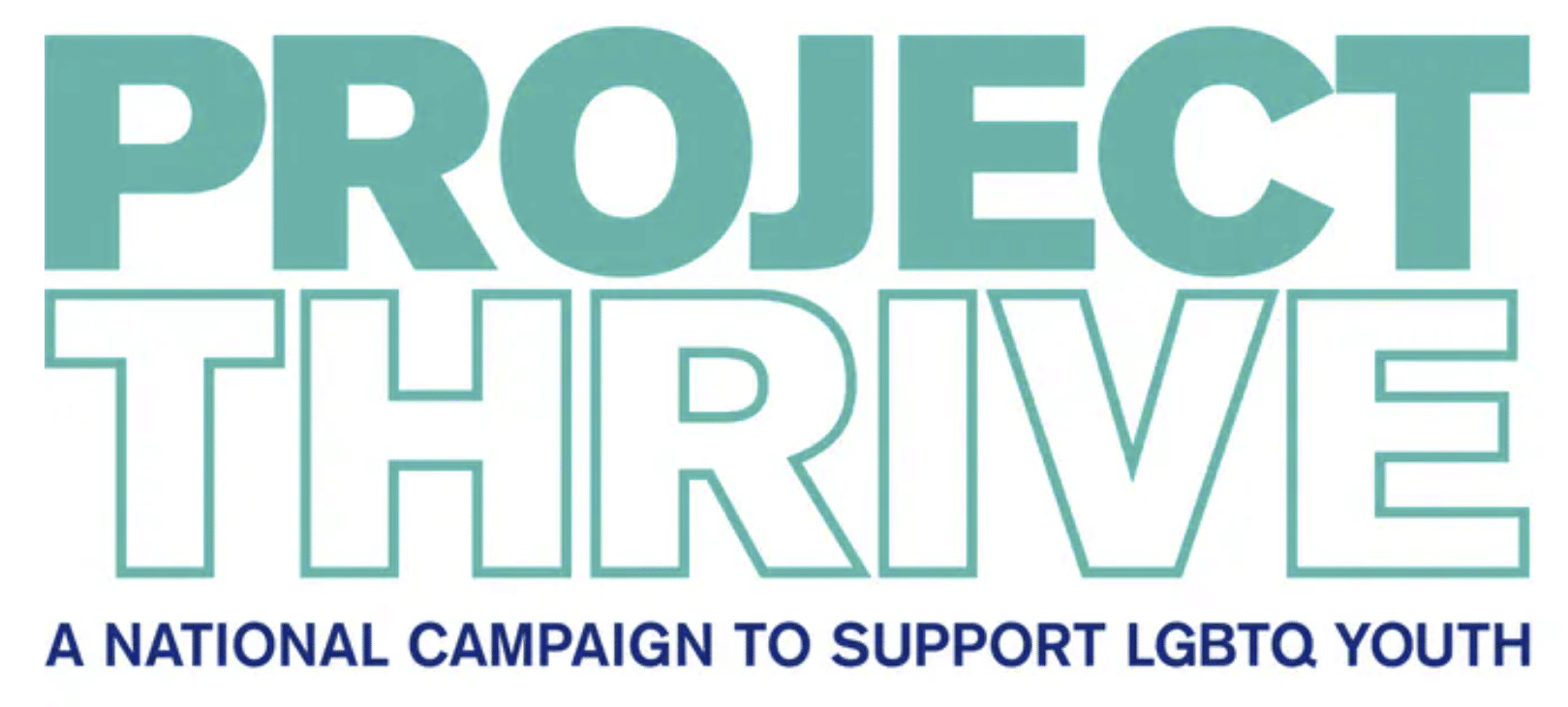 AACTE is honored to share that it has joined the leaders from the nation’s largest health, education, child welfare, legal, and juvenile justice organizations in support of the Human Rights Campaign’s Project THRIVE, a multi-year national campaign to create more equitable, inclusive support systems and communities for LGBTQ youth. The initiative will build the skills and capacities of all youth-serving professionals to better meet the needs of LGBTQ young people.
AACTE is honored to share that it has joined the leaders from the nation’s largest health, education, child welfare, legal, and juvenile justice organizations in support of the Human Rights Campaign’s Project THRIVE, a multi-year national campaign to create more equitable, inclusive support systems and communities for LGBTQ youth. The initiative will build the skills and capacities of all youth-serving professionals to better meet the needs of LGBTQ young people.
Every organization that is part of Project THRIVE has a unique role to play in strengthening family permanence and support, improving health and well-being, increasing school connection, and building a foundation of resilience so that all LGBTQ youth can thrive. Project THRIVE is committed to an intersectional approach in this work, and to ensuring that LGBTQ youth of color and those who are system-involved or have a history of homelessness are a priority focus.
11 May2021
By Leslie T. Fenwick

Illustration by Paige Vickers
This opinion article by AACTE Dean in Residence Leslie T. Fenwick was published in Politico and is reprinted with permission.
The COVID-19 pandemic has exacerbated harmful educational inequalities in the preK-12 public education system. The nation’s poorest students, Black and Latino students, and our disabled students have been the most negatively impacted by school closings necessitated by the pandemic. Black students in high poverty schools have been especially hard hit because of the racialized, historic, and ongoing disinvestment in the education of Black children and youth.
05 May2021
By Weade James

AACTE is pleased to announce the selected states for the Consortium for Research-Based and Equitable Assessments (CREA), a new initiative supported by the Bill & Melinda Gates Foundation. The Consortium, comprised of 14 state teams that include educator preparation programs (EPPs) and their state and local education agencies, will evaluate cut scores for entrance into EPPs, and develop recommendations and model state policies to support state efforts to advance equity and recruit more diverse teacher candidates into the profession.
The 14 selected states and institutions include the following:
04 May2021
By Shandra M. Claiborne-Payton

It is the time of year when AACTE puts out a call for nominations to its programmatic advisory committees. These committees serve the association by providing expert member advice on a wide range of topics related to AACTE’s programs and services. Whatever your professional interests, there is likely a committee that would benefit from your participation.
Have you thought about nominating yourself, but wondered whether serving on one of these committees would be right for you? I can assure you that serving on a programmatic advisory committee is enjoyable, rewarding, and a great professional networking and learning experience. By serving on a committee, you will:
- Ensure that AACTE’s programs and services meet your needs and the needs of your colleagues and institution
- Broaden your professional network to include colleagues from a wide range of institutions around the country
- Deepen your understanding of educator preparation
- Have fun interacting with smart and committed AACTE members and staff
29 Apr2021
By Marquita Grenot-Scheyer
This article originally appeared in Diverse Issues in Higher Education and is reprinted with permission.
 The COVID-19 pandemic shed a harsh light on the systemic inequities in schools and communities. If we believe schools are the epicenter to dismantle racism and inequities, then we must examine our role as teacher educators to address these issues of inequality. How can we use this inflection point to positively and substantively change educator preparation?
The COVID-19 pandemic shed a harsh light on the systemic inequities in schools and communities. If we believe schools are the epicenter to dismantle racism and inequities, then we must examine our role as teacher educators to address these issues of inequality. How can we use this inflection point to positively and substantively change educator preparation?
Both at the system level and on individual campuses, colleges of education must ensure that programs prepare graduates to enter the teaching profession ready to advocate for and implement racial and social justice and advance the transformation of inequitable structures in schools. The pandemic has opened a window into the complexities of the teaching and learning process, which has resulted in greater collaboration among educators and families. As we move forward, we must ensure that candidates’ dispositions reflect and respect the importance of collaboration with students, families, and educational colleagues.
26 Apr2021
By Jerrica Thurman

Time is running out to register for AACTE’s upcoming webinar, “Leaning in and Leading Through Crisis,” on April 29 at 2:00 – 3:00 p.m. Join Education Deans Gaëtane Jean-Marie, Kimberly White-Smith, and Marcie Wycoff-Horn in a deeper dive about how to thrive while navigating the COVID-19 and racial and social justice crises, which have impacted institutions across the nation. As equity-minded leaders, these deans will address ways to meet faculty and students’ needs by starting with empathy and ending with action.
23 Apr2021
By Nicole Dunn
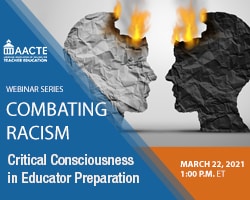 Asian American educator Elizath Kleinrock described her mindset after the reading about the anti-Asian hate crimes in Atlanta last March as, “[un]able to express my sadness, frustration and rage … how could I face my students in class when my body and voice are noticeably shaking?” With anti-Asian hate crimes up 149% in major cities due to increased negative stereotyping amidst the COVID-19 pandemic, the educator preparation community must increase its awareness and efforts by teaching true allyship in U.S. schools and communities.
Asian American educator Elizath Kleinrock described her mindset after the reading about the anti-Asian hate crimes in Atlanta last March as, “[un]able to express my sadness, frustration and rage … how could I face my students in class when my body and voice are noticeably shaking?” With anti-Asian hate crimes up 149% in major cities due to increased negative stereotyping amidst the COVID-19 pandemic, the educator preparation community must increase its awareness and efforts by teaching true allyship in U.S. schools and communities.
In AACTE’s next Combating Racism in Educator Prep series webinar, a distinguished panel will guide a conversation that addresses the often-omitted civil rights history of the Asian American and Pacific Islander (AAPI) here in the United States and resources for teaching that history and why it’s essential in our collective fight to combat systemic racial oppression in our education system. AACTE is ready to seize this present moment to respond to Anti-AAPI racism as an association and hopes you join in these efforts.
Register today to attend the webinar on April 29, 3:30 p.m. EST.
19 Apr2021
By Michael Rose

Since the Supreme Court overturned the Voting Rights Act in 2013, we have seen several states pass legislation that makes it more difficult for certain populations to register to vote and/or cast their ballot. Many of these bills disproportionately impact communities of color and/or low-income voters. This effort has intensified in 2021.
According to one count, as of March 24, legislators have introduced 361 bills with restrictive provisions in 47 states. The various pieces of legislation relate to making voter registration more onerous, allowing local elections officials purge voter rolls, limiting early, in-person voting, and/or tightening voter identification requirements, among other things (there are a handful of states that are trying to make it easier for those of voting age to legally register and cast their ballots).








 As advocates, we want data to be used for accountability and transparency, to tell stories, and to inform impactful, equitable policies. But without context, clarity, transparency, the stories data could tell about school, student, and teacher experiences can be lost to misinformation and distrust.
As advocates, we want data to be used for accountability and transparency, to tell stories, and to inform impactful, equitable policies. But without context, clarity, transparency, the stories data could tell about school, student, and teacher experiences can be lost to misinformation and distrust. 
 Why wait to submit your application for the 2022 AACTE Awards? Avoid the stress of a last-minute rush and submit your entry early. AACTE Awards can be either self-nominated or nominated by a third party. To submit your nomination, visit
Why wait to submit your application for the 2022 AACTE Awards? Avoid the stress of a last-minute rush and submit your entry early. AACTE Awards can be either self-nominated or nominated by a third party. To submit your nomination, visit 
 AACTE is honored to share that it has joined the leaders from the nation’s largest health, education, child welfare, legal, and juvenile justice organizations in support of the Human Rights Campaign’s Project THRIVE, a multi-year national campaign to create more equitable, inclusive support systems and communities for LGBTQ youth. The initiative will build the skills and capacities of all youth-serving professionals to better meet the needs of LGBTQ young people.
AACTE is honored to share that it has joined the leaders from the nation’s largest health, education, child welfare, legal, and juvenile justice organizations in support of the Human Rights Campaign’s Project THRIVE, a multi-year national campaign to create more equitable, inclusive support systems and communities for LGBTQ youth. The initiative will build the skills and capacities of all youth-serving professionals to better meet the needs of LGBTQ young people.


 The COVID-19 pandemic shed a harsh light on the systemic inequities in schools and communities. If we believe schools are the epicenter to dismantle racism and inequities, then we must examine our role as teacher educators to address these issues of inequality. How can we use this inflection point to positively and substantively change educator preparation?
The COVID-19 pandemic shed a harsh light on the systemic inequities in schools and communities. If we believe schools are the epicenter to dismantle racism and inequities, then we must examine our role as teacher educators to address these issues of inequality. How can we use this inflection point to positively and substantively change educator preparation?
 Asian American educator
Asian American educator 